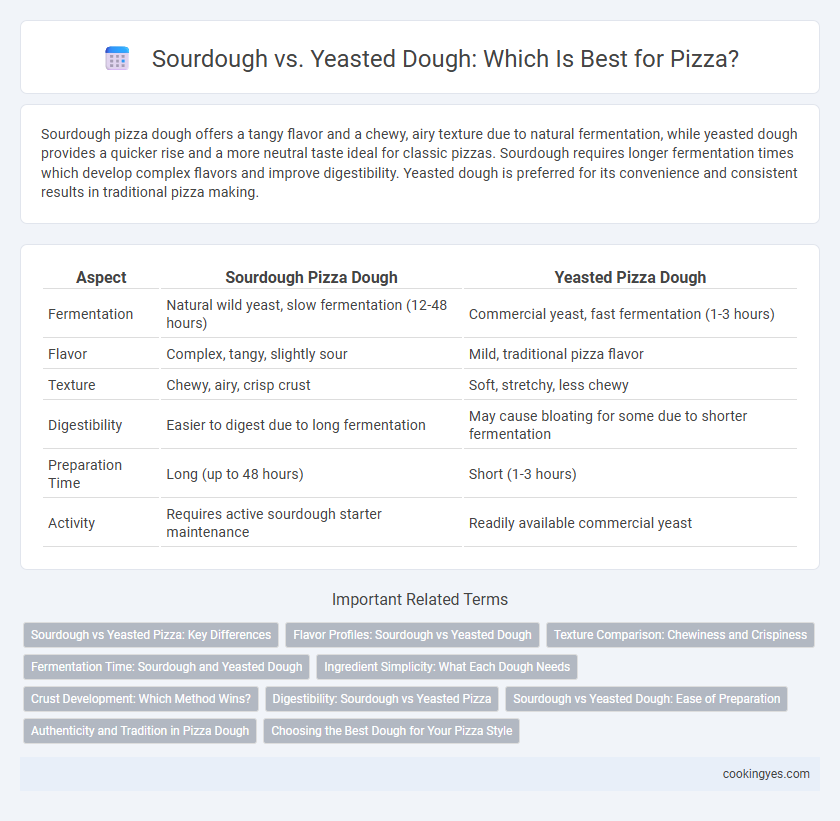Sourdough pizza dough offers a tangy flavor and a chewy, airy texture due to natural fermentation, while yeasted dough provides a quicker rise and a more neutral taste ideal for classic pizzas. Sourdough requires longer fermentation times which develop complex flavors and improve digestibility. Yeasted dough is preferred for its convenience and consistent results in traditional pizza making.
Table of Comparison
| Aspect | Sourdough Pizza Dough | Yeasted Pizza Dough |
|---|---|---|
| Fermentation | Natural wild yeast, slow fermentation (12-48 hours) | Commercial yeast, fast fermentation (1-3 hours) |
| Flavor | Complex, tangy, slightly sour | Mild, traditional pizza flavor |
| Texture | Chewy, airy, crisp crust | Soft, stretchy, less chewy |
| Digestibility | Easier to digest due to long fermentation | May cause bloating for some due to shorter fermentation |
| Preparation Time | Long (up to 48 hours) | Short (1-3 hours) |
| Activity | Requires active sourdough starter maintenance | Readily available commercial yeast |
Sourdough vs Yeasted Pizza: Key Differences
Sourdough pizza dough relies on natural wild yeast and bacteria for fermentation, resulting in a tangy flavor and chewier texture, while yeasted dough uses commercial yeast for faster rise and a more neutral taste. Sourdough fermentation can take 24 to 72 hours, enhancing digestibility and complexity, whereas yeasted dough typically rises within 1 to 2 hours. The choice affects crust crispness, flavor depth, and fermentation time, making sourdough ideal for artisanal pizzas and yeasted dough preferable for quick preparation.
Flavor Profiles: Sourdough vs Yeasted Dough
Sourdough pizza dough offers a complex, tangy flavor with subtle fermentation notes, creating a distinctive depth compared to yeasted dough. Yeasted dough delivers a milder, slightly sweet taste with a softer texture, highlighting the yeast's rapid fermentation process. The natural wild yeast in sourdough enhances umami and acidity, while commercial yeast emphasizes a clean, straightforward flavor profile.
Texture Comparison: Chewiness and Crispiness
Sourdough pizza dough offers a chewy texture with a complex, slightly tangy flavor, resulting from natural fermentation that creates an open crumb structure and a crisp crust. Yeasted dough produces a lighter, airier texture with more uniform bubbles, delivering a crispiness that is typically less dense and more tender than sourdough. Texture preferences often depend on the desired bite experience, with sourdough favoring chewiness and a robust crust, while yeasted dough emphasizes a balanced crispness and softness.
Fermentation Time: Sourdough and Yeasted Dough
Sourdough pizza dough requires a significantly longer fermentation time, often ranging from 12 to 48 hours, which enhances flavor complexity and improves dough texture through natural wild yeast and lactobacilli activity. In contrast, yeasted dough typically ferments between 1 to 3 hours, relying on commercial yeast for faster carbon dioxide production and dough rise. Extended fermentation in sourdough contributes to a tangy taste and chewier crust, while yeasted dough delivers a softer, more neutral flavor profile.
Ingredient Simplicity: What Each Dough Needs
Sourdough pizza dough requires a natural starter made from fermented flour and water, relying on wild yeast and lactic acid bacteria for fermentation, which simplifies ingredients to just flour, water, salt, and starter. Yeasted pizza dough depends on commercial yeast, typically active dry or instant yeast, combined with flour, water, salt, and sometimes a touch of sugar or oil for easier and faster fermentation. The ingredient simplicity in sourdough emphasizes natural fermentation without additives, while yeasted dough offers consistency and speed with minimal ingredient variation.
Crust Development: Which Method Wins?
Sourdough pizza dough produces a crust with complex flavor profiles and a chewy, airy texture due to natural fermentation and longer rise times. Yeasted dough creates a more consistent, tender crust with quicker fermentation, ideal for faster preparation and a slightly sweeter taste. Crust development favors sourdough for depth and crispiness, while yeasted dough excels in softness and rise speed.
Digestibility: Sourdough vs Yeasted Pizza
Sourdough pizza dough contains natural lactobacilli and wild yeast that improve digestibility by breaking down gluten and fermenting sugars more thoroughly than commercial yeast in yeasted dough. This extended fermentation reduces phytic acid and makes nutrients more bioavailable, enhancing gut health and easing digestion. Yeasted pizza dough ferments faster but often retains higher gluten content, which can cause bloating or discomfort for sensitive individuals.
Sourdough vs Yeasted Dough: Ease of Preparation
Sourdough pizza dough requires a longer fermentation period and careful maintenance of the starter culture, making it more time-intensive to prepare compared to yeasted dough. Yeasted dough relies on commercial yeast, which activates quickly and produces a reliable rise within 1 to 2 hours, streamlining the preparation process. The complexity of sourdough fermentation adds unique flavor and texture but demands more patience and experience, while yeasted dough offers simplicity and consistency favored by many home bakers.
Authenticity and Tradition in Pizza Dough
Sourdough pizza dough offers an authentic, traditional flavor profile rooted in ancient fermentation techniques that enhance depth and complexity. Yeasted dough, while quicker to prepare, relies on commercial yeast for a lighter texture but lacks the rustic character inherent to sourdough. Authentic Neapolitan pizza, recognized by the Associazione Verace Pizza Napoletana, often emphasizes naturally fermented doughs to preserve heritage and craftsmanship.
Choosing the Best Dough for Your Pizza Style
Sourdough pizza dough offers a tangy flavor and chewy texture due to natural fermentation, ideal for artisan and Neapolitan-style pizzas. Yeasted dough, rising faster with commercial yeast, provides a lighter, fluffier crust perfect for classic American or New York-style pizzas. Selecting the best dough depends on desired taste, texture, and preparation time, with sourdough favored for depth of flavor and yeasted dough preferred for ease and consistency.
Sourdough vs Yeasted for pizza dough Infographic

 cookingyes.com
cookingyes.com